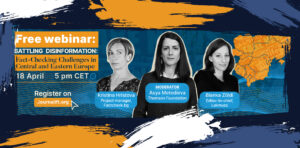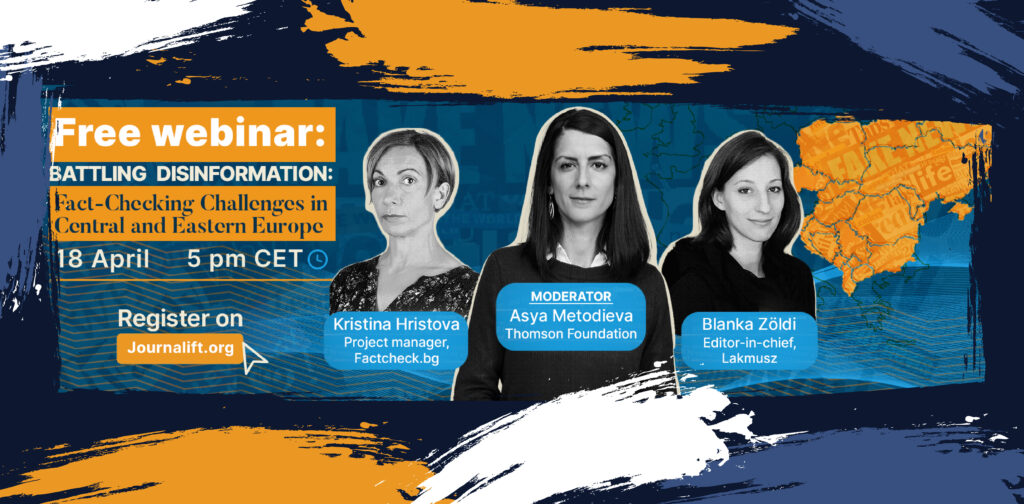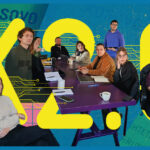A strong business is a carefully planned one, in pace with trends and focused on consumer needs; and this adheres to media industries, too. Being a capitalist economic system, the media industries are businesses that must be profitable in order to survive, while at the same time perform ethically and responsibly.
Issues in regard to media economics and media integrity have been questioned a lot during the unprecedented time of the COVID-19 pandemic.
The rapid spread of the coronavirus affected the media consumption by speeding up the shift to digital and put online news media in a rather favorable position as the most frequently used source of news.
As revealed by the Digital News Report 2020 of Reuters Institute and University of Oxford, the majority of the population across all countries preferred to start news journeys with a website or app. Apart from shifting our behavior in regard to media usage, the pandemic raised lots of challenges for the media in the aspect of economy and trust. Due to the economic recession, there were less incomes, while the absence of gatekeepers in online sources led to misinformation and fake news. These challenges served as a catalyst for changes in media business models.
Where do local online media stand in this map of changes? What’s their business model? What are the steps they should take over to survive, be profitable and maintain their integrity?
While the pandemic was a global challenge in all aspects, local online media proved to be beneficial in some aspects. People relied mostly on online news, whilst there were huge jumps in traffic to local news sites as people were more interested in knowing how the pandemic was affecting their hometowns. According to a research conducted in 2020 by the Center for media research of the Faculty of Political Sciences in Serbia, the pandemic transformed the society in regard to communications, increasing the number of internet users to 78.4% from 24% in 2006. The same research revealed that the main source of news for 35% of the respondents were traditional media websites, and for 32% were social networks, which by 76% of respondents were accessed from the mobile phone despite 17% who used the computer. Moreover, the results showed that 95% of the respondents preferred online media as a source of news. Similar to Serbia, the Croatian media market, as revealed in Digital News Report 2020, is also characterized with high internet connectedness, with 78% reported use of smartphones for weekly news.
The question is how to take advantage of these favorable circumstances? Lessons derived from the Montenegrin news portal Ul-info, whom I was mentoring during the Media for All project, might come in hand for online media operating in similar surroundings.
Ul-Info is a Montenegrin news portal that delivers quality and trusted journalism across its digital platform.
To remain competitive with other news sources in the region, Ul-Info needed a greater understanding of how to reach customers effectively and develop new revenue streams that will establish long-term sustainability.

Three steps to success
Step 1: Channel optimization
In order for online media to survive, adapt, and thrive in a fast-changing world the 1st step should be optimizing their channel of communication. Taking into consideration that the population relies on online websites for news, that there is an increase in mobile users, and that the website is the first touch of the media with its audience, it is very important and worth investing in the website development. Thus, Ul-info saw as its 1st step into maximizing its presence on the online space by redesigning its website and designing an app for iOS and Android.
Platform optimization
Based on a SWOT analysis conducted by Ul-Info, the website according to today’s trends should have an attractive architecture design that will make it visually appealing. All new trends are reflected in the new website. Ul-Info's new website design is responsive, so that it is easily viewable and usable in various devices such as PC, mobile, and/or tablet. Moreover, it is functional with a fast-speed loading. The visual representation, responsiveness and the functionality are main factors that make people stay on a website and offer a favorable bounce rate. Other than those mentioned, the website has a friendly navigation that is intuitive and easy to follow. Furthermore, the website offers multimodal content in which information is presented in text, images, audio, and video, and great ad space management.
Mobile App
Aside from the website redesign, portal Ul-info saw as a necessity of today's trend to invest in a mobile app for iOS and Android platforms. Users spend a substantial amount of time on mobile devices and encounter the apps they’ve installed on their devices almost every day. Mobile apps offer unique service for today’s media because they offer better connection and engagement levels with the audience and support the creation of a loyal community.
Both, the website and the app need to look at the media’s icon and logo, which go hand in hand with the channel optimization. They represent a recognizable symbol of the media and should resonate with today’s market and trends. Ul-Info redesigned its logo before the website.
After Ul-Info’s website redesign the number of readers for just a month increased by 25% and the number of Facebook followers increased from 12k to 14k.

Step 2: Reader Focus
Once you have set up the website, your 2nd step is creating a loyal community of readers. You can reach this by writing valuable content that aligns with the reader's needs and by engaging your readers. The content is the most obvious product that a news website provides, and it is the means by which a media attracts readers. Marketing stresses the importance of understanding the consumer, whose wishes are to be heard in the process of developing the products and services. Similarly, in the media business you should produce your media content aligned with your reader’s needs.
The Mom Test provided information to Ul-Info in regard to its potential reader’s interests in terms of content. Rob Fitzpatrick in his book “The Mom Test” offers guidelines on how to craft good questions for useful feedback. It’s called The Mom Test because it leads to questions that even your mom can’t lie to you about. Following Fitzpatrick’s rules, through an informal conversation with target customers, Ul-info realized that they should extend its content in regard to new categories (home and entertainments), and new types of content (short info title videos and podcasts). With other words, The Mom Test provided to Ul-Info information on what were the readers' needs that they should focus on.
Only after you have a media content that satisfies readers’ needs you have created conditions to engage and develop a relationship with them. News websites can offer readers engagement through a space for comments, a section dedicated to user produced content, a space where readers can report mistakes to be corrected by journalists, an email and newsletter connectedness and an option to create a personalized feed on the website.

Step 3: Monetization/Digital revenue streams
Only after having a great website and a relationship with the readers, one can step further and start thinking about the business model. From a management perspective, customer relationships are essential to a business model: by developing them, companies are able to make a connection between their value propositions and their customer segments, and eventually, acquire revenue from it. Through readers engagement you can strengthen the relationship with members and reinforce their importance for the business model.
Osterwalder and Pigneur (2010) offered the concept of the Business Model Canvas (BMC), described by 9 building blocks that show the logic of how a company intends to make money. The tool helps to overcome the main challenge of the media today, generating revenue and benefits through its content. The 9 blocks of the BMC that follow a logical sequence are: (1) Customer Segments, (2) Value Proposition, (3) Channels, (4) Customer Relationships, (5) Revenue Streams, (6) Key resources, (7) Key Activities, (8) Key Partnerships, and (9) Cost Structure.
Digital revenue streams
This tool helped Ul-Info to get an insight about the customer segments it serves and value propositions it offers; and subsequently find a way to diversify its financing sources beyond advertising and donations/project grants. In a period of uncertainty caused by the pandemics it was a perfect time to look for different sources of financing. Going through their BMC they concluded that they should combine revenue streams, such as, advertisement, memberships, subscriptions, donations, paid content, and new digital service.
Advertisements and paid content were selling space and digital traffic to external advertisers. On the other hand, new digital service utilizes medias’ content to achieve traffic and then use the traffic to push forward new digital service; in Ul-Info’s case, the service of renting apartments for tourist purposes. Thus, the media outlet will earn income as a result of connecting a consumer and a supplier. This service will be connected to the media content having in mind that the portal covers news of Ulcinj and has sections of tourism and travelling within the website.
Subscriptions will be used to sell media content to readers. In this case the revenue stream will be the reader’s payment for access to media content. However, the Mom Test conducted by Ul-info revealed that the target readers at this point were not prepared to pay for news they could get for free elsewhere. Thus, it needs a lot of work to be done to converse the reader through the funnel.
After website redesign and new revenue streams for one-month Ul-Info managed to increase its revenues by almost 40%.
In sum, Ul-Info's 3 steps to a sustainable news website ensure that its technology platform is up to date, its content is reader focused, and it uses the traffic to generate income. After all, the digital media landscape is not a terra incognita. You just need to follow the good examples of the media industry!
































